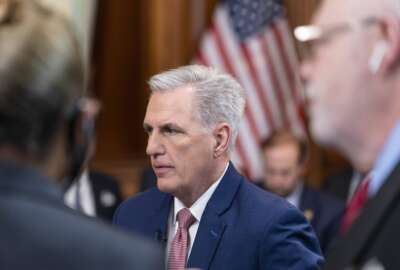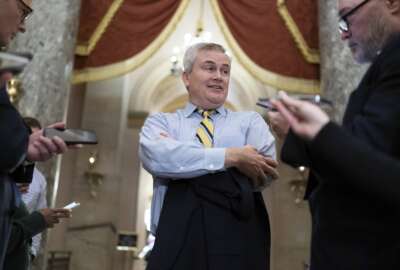
As the 118th Congress gets underway, it’s hard for most to look past the possible debt ceiling showdown
You’ve seen this before working in or with the federal government: A split government by party lines can mean possible issues when things like the debt...
You’ve seen this before working in or with the federal government: A split government by party lines can mean possible issues when things like the debt ceiling come up. Most times a deal is struck right as time runs out or just before it. Could this time be different though? To get a sense of where things stand, the Federal Drive with Tom Temin spoke with WTOP Capitol Hill Correspondent Mitchell Miller.
Interview transcript:
Mitchell Miller
This battle over the federal debt ceiling and whether to raise it is really going to be getting into its early stages now. And we’re going to see this play out over the next several weeks and months, unfortunately. And a lot of people on Capitol Hill right now are saying that there are many parallels to what it was in 2011. But they’re worried that it could be even worse, that we might actually get to the brink, even closer than more than a decade ago. And that is in part because of what’s happening with House Republicans. Many people, whether they’re Republican or Democrat, but particularly Democrats are concerned that Kevin McCarthy, the new House speaker, is not going to be able to wield the control that he needs over the far right part of his conference. And right now, there really is no specific plan, as far as what cuts are being called for by Republicans. Republicans have definitely made it clear that they want this to be linked to getting more reductions in federal spending. Democrats are complaining about the fact that there isn’t any specific proposals. Republicans say this is very early, that they have to work this out within their conference. But as an example, let’s take a look at some of the things that Republicans are already saying are off the table: Social Security, Medicare, potentially Defense. So of course, that only leaves discretionary spending, and that would ultimately go to federal agencies, potentially affecting federal workers. So there’s also some nervousness, I think, right now, among many of the unions that are representing federal workers. They say it’s very early, and they don’t want to over predict anything. But right now, they’re concerned that if this does get to the brink, and it really gets close to what they believe is going to be this June deadline, then we could be talking about not only rattling of the markets, but also concerns about whether federal workers are going to get paid on time. And of course, the biggest concern: Would the government actually default? And that is the biggest nightmare for Republicans and Democrats as well as the White House. Nobody wants it to happen. But there seems to be less predictability about this crisis than there have been in many others related to Congress and the White House.Eric White
Yeah. And as you just said, it’s hard to predict. But does that uncertainty mean that maybe federal workers should gear up and then start saving some money just in case?Mitchell Miller
I think so. And I think a lot of the union leaders are saying that people should be keeping a close eye on this, that don’t just think that even if you’ve been a federal employee for many, many, many years, and you say, Okay, I’ve seen this movie before, there’s going to be a lot of drama here and there, and then eventually, it’s going to get worked out. Now, Senate Minority Leader Mitch McConnell says he has confidence that it will be worked out and that there won’t be a default. And he potentially could step in if things get really crazy on the House side with the Republicans. But I think because of this uncertainty, it would be a wise thing for a lot of federal workers to start looking at the fact that there could be some very big disruptions in the coming months. So it’s better to be a little bit more careful and a little bit more aware of what this could be, than to just kind of roll your eyes and say, Yeah, I’ve seen this before, we always raise the debt ceiling. It’s been raised close to 80 times before. But this one does seem a bit different.Eric White
Well, it’s not all bad news for federal employees on the hill. They have a long standing advocate who was trying to get them some more money when they do work. What can you tell me about Congressman [Gerry] Connelly’s (D-Va.) latest efforts?Mitchell Miller
Right, Virginia Congressman Gerry Connolly, the Democratic lawmaker, a longtime supporter of federal workers here in the Washington area, as well as across the country. He has once again come out with his proposal related to the FAIR Act that would give federal workers an 8.7% pay increase in 2024. This is the ninth year in a row that he has proposed this and this time he cites the fact that many federal workers persevered during the pandemic. He also notes they’ve endured government shutdowns in recent years, pay freezes, agency cuts in recent years. And his proposal once again has the support of major unions that endorsed federal workers including AFGE, the American Federation of Government Employees. It also has the support of many Washington area lawmakers as well as from other states, but notably they are all Democrats. So with Republicans in control of the House, this does seem like it probably is not going to go much further than other proposals have in the past. It does put the alert out there that there are people advocating for federal workers within the Congress, and that they are going to keep pushing for this. But at the moment, I think that this is probably going to go the way that many of the other proposals have in the past years.Eric White
Got it. And yeah, with that change in parties, and the change in committee assignments comes the changes to the way oversight is conducted by Congress. Can you tell me about what some of these committee changes and what these changes could mean, as far as agency oversight of federal issues?Mitchell Miller
Yes, one of the biggest changes involves the what used to be called the House Oversight and Government Reform Committee, it has now been renamed by Republicans as the House Oversight and Accountability committee. And that really reflects a change in mission, in part, related to this. This is chaired by Kentucky Congressman James Comer (R). He has already been very aggressive, with a lot of letters going out to the White House on a variety of issues related to oversight, indicating that the panel will investigate a lot of issues related to the White House. There’s been talk about what kind of things could be going on with President [Joe] Biden and his son, Hunter Biden, just among many. But then, in terms of what it would mean for federal workers, it looks like there’s going to be a shift in in the way that the subcommittees under this major committee are going to be moved around. And as Jason Miller from Federal News Network has reported, it looks like the government operations subcommittee, which Gerry Connolly of Virginia has been very involved with, may now be divided into two parts: One would focus on the government operations and the federal workforce, which has been a traditional part of this committee, while a new committee would address things like cybersecurity, IT, government innovation, that type of thing. And the committee with the new government operations and federal workforce area, they’re going to have oversight over the federal civil service. So not a lot of changes there. But I think, in connection with the cybersecurity focus, there will be some changes there. By the way, these two committees used to be one subcommittee, they were brought together by Gerry Connolly, mainly because he had a lot of expertise and really was interested in both of the areas. So that will be a change kind of going back to the way it was before. Also, there’s been some shuffling around with other subcommittees, within this area: One of them is going to focus on economic growth. Republicans are really big on that. They want to look at regulatory affairs. Also drilling down on whether or not in their view, too many bureaucratic regulations on a lot of things that are restricting innovation. And then another one would look at healthcare and financial services oversight. So that will be a new area. And then there’s also going to be one that’s pretty much similar to the way it is now, but with a different emphasis. And that’s on national security. Republicans, of course, really big on taking a better look and closer look at what’s happening at the border. So they are putting that under the rubric of that committee saying that they will really be looking at U.S. border security, and Homeland Security under that panel. So a lot of changes. And that’s just one committee. There are several other changes within the other committees. But I think that’s one you’re going to really see a big impact related to federal agencies and federal workers.Eric White
Yeah, I’m just curious, in your reporting and coverage of Congress over the years, did the January 6 committee kind of change how congressional oversight is going to be conducted? Are we going to see more aggressive actions taken towards more political topics? Now, as you know, House Republicans now taking over may feel like, Hey, you went all out for that. So we’re gonna go hard the other way?Mitchell Miller
There’s no question about that. The January 6 select committee really has had a ripple effect in this Congress already. That was at the time when then-House Speaker Nancy Pelosi (D-Calif.) decided to reject two of the members that then Minority Leader Kevin McCarthy wanted to put on that committee. And when that happened, he said, beware what happens if we take over the House again, we are going to change some things on our end. And that’s exactly what has happened. You see that the former chairman of the House Intelligence Committee, Adam Schiff (Calif.), the Democrat, he has been prevented from serving on that committee. That is some something that Kevin McCarthy, as House Speaker has power to do. He’s also eliminating Eric Swalwell, another prominent Democrat who’s been very critical of Republicans. So you’re seeing kind of a tit for tat here on that committee, particularly, but also you’re going to see a shift overall in the committees at large. Of course, obviously, because Republicans are in power now they control all these committees and they have more Republicans than Democrats on the committee. So they’re going to be in the power seat there in connection with legislation. Of course, that part is more regular. Now, the interesting thing about that is the Democratic majority and the Republican current majority are almost mirror images of what they were. Democrats also had a very slim majority. So the numbers on those committees are fairly similar. But one other committee, the so called weaponization subcommittee, that will be chaired by Jim Jordan (R) of Ohio, that represents exactly what you’re talking about, the fact that Republicans are going to be looking at basically investigations of investigations, saying that there was not enough done by Democrats, whether it’s looking at the source of COVID, or corruption that they think is in various parts of the federal government. They are going to be taking a really hard look at a lot of federal agencies. So that is, again, something that federal agencies and federal workers need to be well aware of.
Copyright © 2025 Federal News Network. All rights reserved. This website is not intended for users located within the European Economic Area.
Tom Temin is host of the Federal Drive and has been providing insight on federal technology and management issues for more than 30 years.
Follow @tteminWFED
Related Stories





